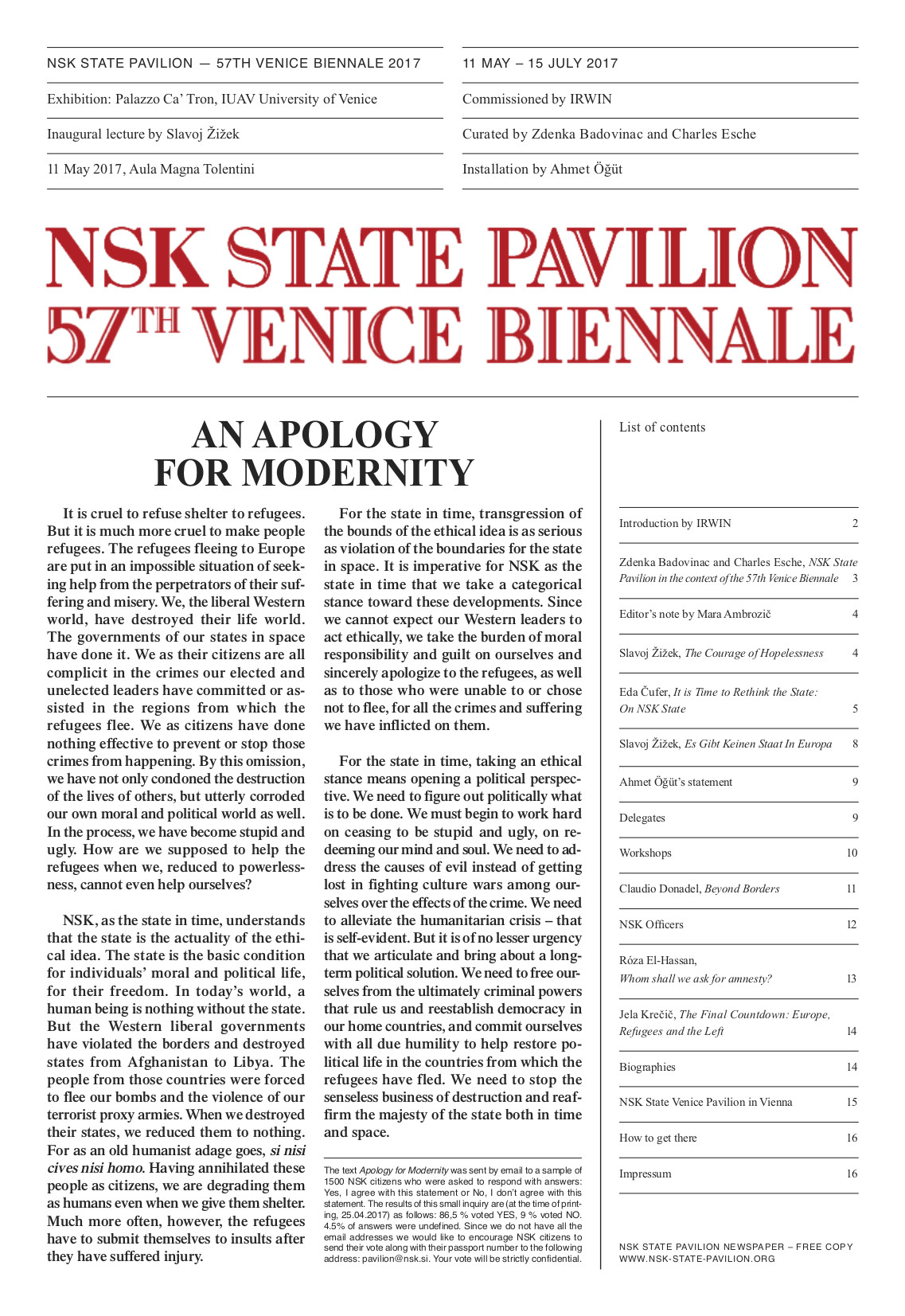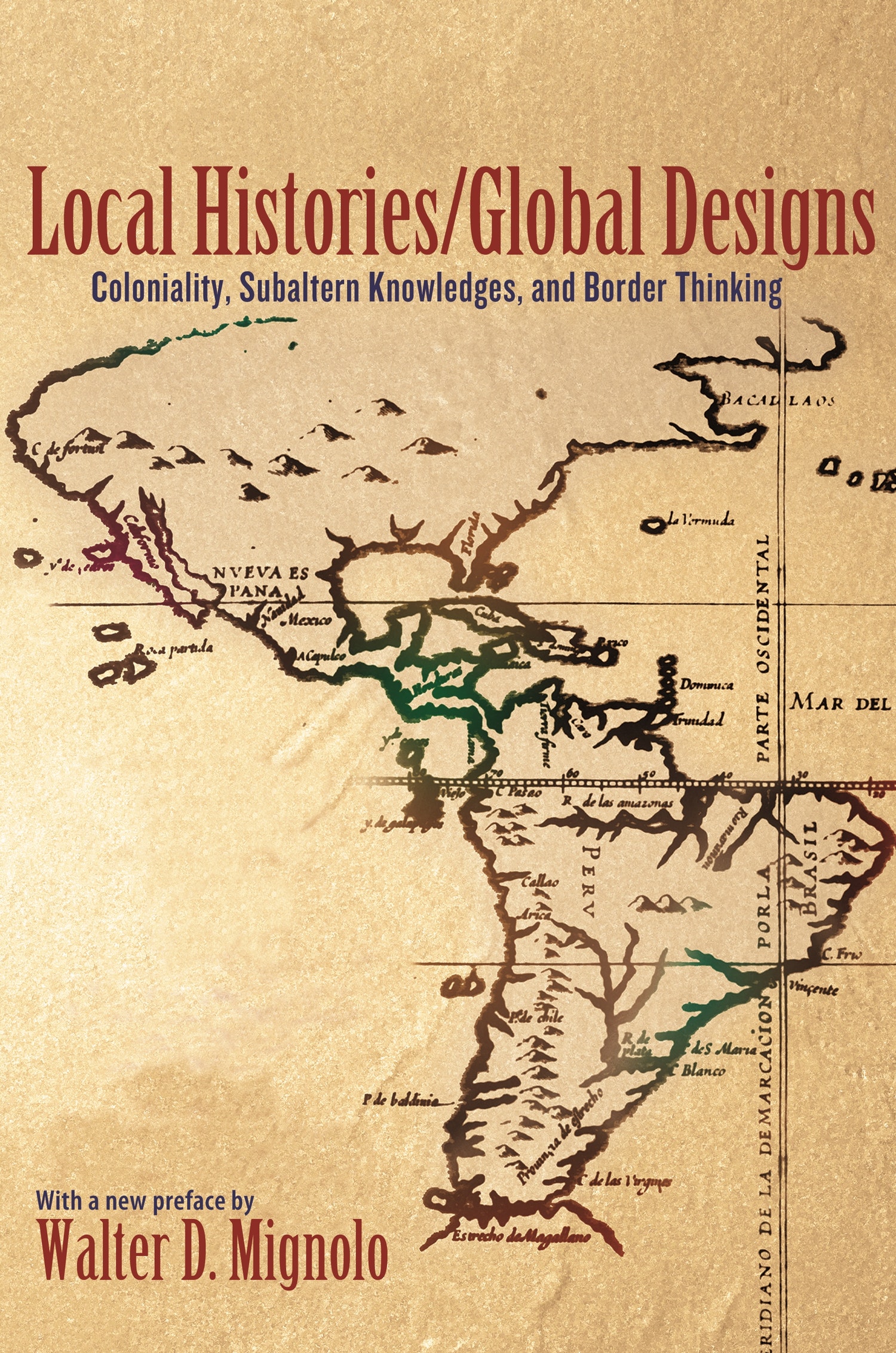NSK State Pavilion: 57th Venice Biennale (2017)
Filed under newspaper | Tags: · art, borders, migration, refugees

“NSK State in Time was founded by artist collective Neue Slowenische Kunst (NSK) in 1992. It was conceived as a utopian formation, which would have no physical territory and would not be identified with any existing nation state. Along with organising temporary embassies and consulates in cities such as Moscow, Berlin, Florence, Sarajevo and New York, NSK State in Time began issuing passports in 1993. There are currently about 15,000 NSK Passport holders around the world, with well known citizens including including Marina Abramović, John Baldessari, Boris Groys, Hans Ulrich Obrist and Slavoj Žižek.
The NSK State Pavilion provided an added and new dimension to NSK State in Time, built upon a collaboration with migrant communities, humanitarian protection applicants, and stateless individuals who are looking for new citizenship. At the Venice Biennale, the project aimed to rethink what a contemporary state can be, offering an open form of citizenship which contrasts with that generated by spatially-defined states.”
With contributions by Zdenka Badovinovac and Charles Esche, Eda Čufer, Claudio Donadel, Róza El-Hassan, Jela Krečič, and Slavoj Žižek.
Edited by Mara Ambrožič
Publisher Irwin, 2017
16 pages
Walter D. Mignolo: Local Histories/Global Designs: Coloniality, Subaltern Knowledges, and Border Thinking (1999)
Filed under book | Tags: · anthropology, borders, colonialism, decolonization, epistemology, gender, globalisation, hermeneutics, history, knowledge, language, latin america, modernity, occidentalism, pluriversality, postcolonialism, subaltern studies, theory, zapatistas

“This book is an extended argument on the “coloniality” of power by one of the most innovative scholars of Latin American studies. In a shrinking world where sharp dichotomies, such as East/West and developing/developed, blur and shift, Walter Mignolo points to the inadequacy of current practice in the social sciences and area studies. He introduces the crucial notion of “colonial difference” into study of the modern colonial world. He also traces the emergence of new forms of knowledge, which he calls “border thinking.”
Further, he expands the horizons of those debates already under way in postcolonial studies of Asia and Africa by employing the terms and concerns of New World scholarship. His concept of “border gnosis,” or what is known from the perspective of an empire’s borderlands, counters the tendency of occidentalist perspectives to dominate, and thus limit, understanding.
The book is divided into three parts: the first chapter deals with epistemology and postcoloniality; the next three chapters deal with the geopolitics of knowledge; the last three deal with the languages and cultures of scholarship. Here the author reintroduces the analysis of civilization from the perspective of globalization and argues that, rather than one “civilizing” process dominated by the West, the continually emerging subaltern voices break down the dichotomies characteristic of any cultural imperialism. By underscoring the fractures between globalization and mundialización, Mignolo shows the locations of emerging border epistemologies, and of post-occidental reason.”
Publisher Princeton University Press, 1999
Princeton Studies in Culture/Power/History series
ISBN 0691001405, 9780691001401
xix+371 pages
Interview with author (L. Elena Delgado and Rolando J. Romero, Discourse, 2000)
Author on pluriversality (2013)
Review: Serge Gruzinski (Annales, 2002, FR).
Commentary: Linda Martín Alcoff (CR, 2007).
PDF (17 MB)
Comment (0)Trinh T. Minh-ha: Elsewhere, Within Here: Immigration, Refugeeism and the Boundary Event (2010)
Filed under book | Tags: · art, borders, feminism, home, immigration, language, migration, postcolonialism, refugees

“Elsewhere, Within Here is an engaging look at travel across national borders–as a foreigner, a tourist, an immigrant, a refugee—in a pre- and post-9/11 world. Who is welcome where? What does it mean to feel out of place in the country you call home? When does the stranger appear in these times of dark metamorphoses? These are some of the issues addressed by the author as she examines the cultural meaning and complexities of travel, immigration, home and exile. The boundary, seen both as a material and immaterial event, is where endings pass into beginnings. Building upon themes present in her earlier work on hybridity and displacement in the median passage, and illuminating the ways in which ‘every voyage can be said to involve a re-siting of boundaries,’ Trinh T. Minh-ha leads her readers through an investigation of what it means to be an insider and an outsider in this ‘epoch of global fear.'”
Publisher Routledge, 2010
ISBN 0415880211, 9780415880213
vii+139 pages
via Neda
Author’s talk on Said’s work (audio, 18 min)
Reviews: Shinhyung Choi (Dark Matter 2011), Delila Omerbašić (Journal of Refugee Studies 2013).
PDF (21 MB, no OCR, updated on 2021-5-3)
Comment (0)
